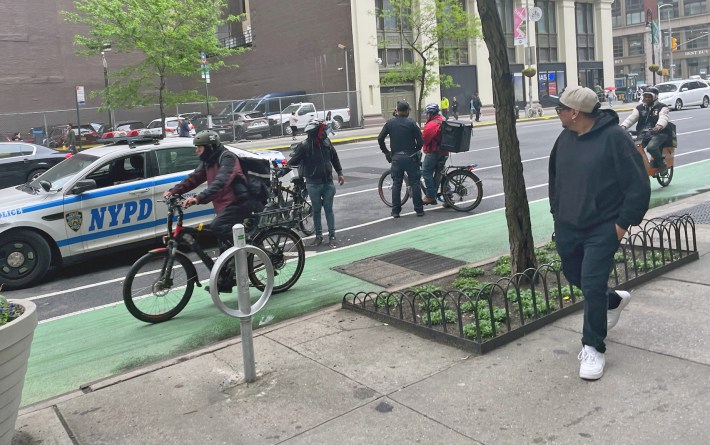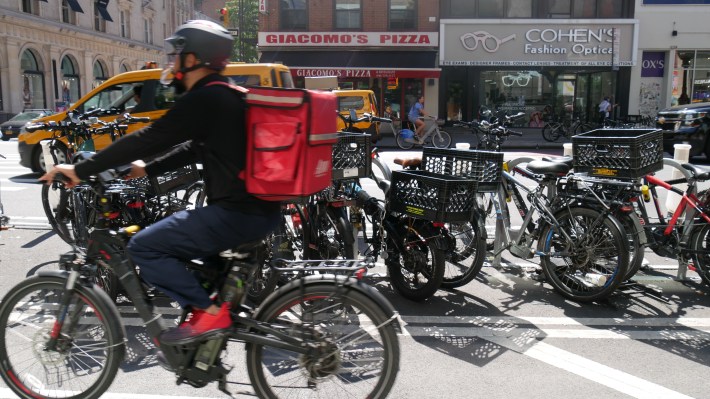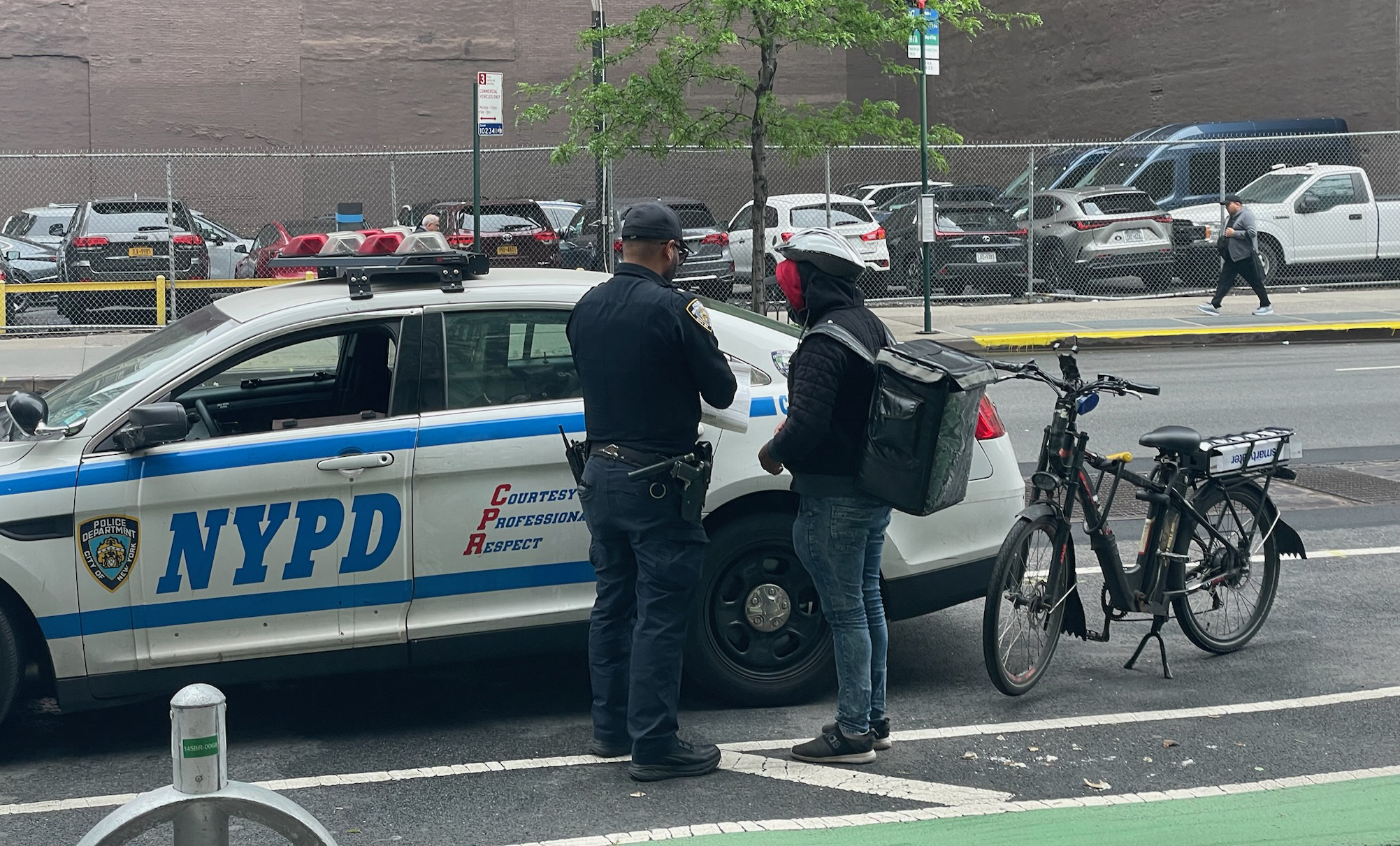The NYPD’s new push to criminalize trivial cycling traffic violations will jeopardize the immigration cases of the city’s mostly immigrant delivery workforce, lawyers warn — and it's already stigmatizing hard-working people trying to get a foothold in the Land of the Free.
The policy shift quietly began two weeks ago with the NYPD saying it would begin hitting cyclists with criminal summonses instead of the typical traffic tickets. This means if you’re on a bike and you get caught breaking a traffic rule — like running a red light, riding on the sidewalk, or not yielding to a pedestrian — you will be ordered to appear in criminal court or risk an arrest warrant.
The NYPD said the new move is in response to complaints about e-bikes, which are mostly used by the city’s delivery workforce, but the agency has not backed up its claim by providing any data. The new enforcement push has resulted in cops pouncing on oncoming cyclists and entrapping delivery workers using popular bike lane routes, as Streetsblog reported.

“It’s crazy outside. The police they just want to ticket you for any reason, no matter what,” said one delivery worker last week.
Workers targeted
Delivery workers on the ground are already feeling the heat. One worker, who asked to be identified by his first name, said that he and others are afraid of what could happen if they get a criminal summons. He already has felt an uptick of enforcement, especially in certain areas of Manhattan, like Midtown, where he recently got a ticket.
“It was midnight and raining, no one was on the street except for me and the cop,” said SP, who is originally from Angola and has been working delivery for various apps for four years.
When he rolled through the red light at Third Avenue and 36th Street, the cop stopped him and wrote a ticket, this was just before the switch to criminal summonses. SP said he feels lucky he only got a traffic violation.
But the officer told him he pulled him over because of complaints and that he was doing it to “protect the community.”
“You’re saying between the lines that I am not part of this community, that you’re protecting them from me,” SP told Streetsblog. “It’s so scary now you can’t even ride in peace. The police are literally targeting the delivery guys. Even the way that they cover the path is a little bit threatening. You just see a cop stopped in the middle of the bike path.”
SP said that his community of delivery workers is scared. They heard about the new policy because someone shared Streetsblog’s article in their group chat, but they still don’t fully understand how it could affect them. Because of the overall anti-immigrant sentiment coming from the federal government, they fear any contact with the criminal system because they don’t trust that they will get due process.
“People think, okay this is America, there's due process for everything. But lately, the track record shows that sometimes there is not [due process] and there's nothing that people can do about it. [Delivery workers] are afraid of being that exception. They are afraid of being that person that the thing happens to,” said SP.
A block of ICE
Cyclists who are not citizens are especially afraid. Any contact with the criminal legal system can jeopardize the already subjective and delicate dance of applying for asylum seeker status, through which many delivery workers are going.
“It’s hugely disturbing,” Council Member Alexa Avilés (D-Sunset Park) told Streetsblog. “We know in this current political context that contact with the NYPD is a premise for the deportation pipeline. This abrupt change with no evidence and no real plan is more of Eric Adams trying to deliver on his quid pro quo with the Trump administration.”
Lawyers who specialize in immigration, cycling violations, and police accountability agree.
"For people with immigration issues, it’s a whole terrifying can of worms. This is going to fuck up someone’s life in a serious way,” said Brandon Chamberlin, an attorney with the bike-focused firm Adam White Law.
And Immigration lawyers say this is exactly the kind of thing that can derail a case.
“Anything that brings negative attention to you from immigration is very risky, because it could lead to them deciding to detain you,” said Sarah Vendzules, a lawyer and the director of the immigrant justice team at the Legal Aid Society’s criminal defense practice.
“Especially this current administration, where they're sort of instructed to try to detain as many people as possible. I would be worried if my client had to go to a check in, and they'd recently been given one of these summonses.”
The process
The NYPD has options under New York State law when cops observe a violation of the vehicle and traffic law, such as a cyclist riding on the sidewalk.
A cop can issue a violation, which is a ticket separate from the criminal system and processed by an administrative branch of the city government that accepts payment or deals with disputes. This was how cops were handling cycling violations for the most part, until the recent policy change.
Now, the Adams administration and its top cop Jessica Tisch have instructed officers to use their other option: to issue a criminal court appearance ticket.
When the so-called "pink summons" is issued, a suspect is ordered to appear in summons court — and missing that court date leads to a warrant issued for the suspect's arrest and a pursuit by the NYPD’s “warrant squad.”
New York City is a sanctuary city, which means broadly that the various agencies do not cooperate with federal immigration officials. Even so, there are various information-sharing systems in place that allow for ICE to receive information about an arrest.
Usually, someone brought in by the warrant squad for a non-criminal infraction would not be booked and fingerprinted, which is the main way ICE gets information. But a criminal case is public information, and ICE could be monitoring the court calendar.
A new immigration landscape
There are a lot of unknowns with this new policy. What lawyers know for sure is that a criminal summons opens the door for trouble, especially for people with open immigration cases.
“We don’t exactly know what this looks like, because none of the criminal summonses have been adjudicated yet," said Daniel Flanzig, an attorney with New York Bike Lawyers, who frequently works with crash victims. "We’re living in a world right now, it doesn’t take much [for ICE to get involved], it doesn’t take anything."
People applying for asylum are required to disclose any contact with the criminal system, and that would now include these criminal summonses.
And few immigration experts trust Mayor Adams. When the administration’s new criminal summons policy on cyclist summonses was revealed by Streetsblog, many saw it as a clear move by Adams and his NYPD to bring immigrant workers of varying legal status into the criminal system, opening the door to ICE collaboration.
“I feel like it's clear that he is meeting the mandate for the Trump administration. He works for Trump. He's clearly not working for New Yorkers,” said Avilés.

Where are the app companies?
Many pedestrians do indeed complain of a “Wild West” feel on New York City streets right now, which is partly the result of tens of thousands of delivery workers struggling to fill a need created by people using delivery apps to get stuff quickly to their homes.
But the workers are not technically employees of the multimillion dollar app companies they work for, instead they are private contractors lacking basic labor protections. Workers have long maintained that the app companies incentivize fast deliveries. Even after receiving a minimum wage, workers still say if they are late to a delivery they can be penalized by the company and lose out on hours.

In February, the Adams administration leaked a draft bill to the press which would have completely overhauled the app delivery industry. The proposal was the first sign that the administration was considering regulations, something the mayor promised when he announced in early 2024 that he would create a new "Department of Sustainable Delivery."
That “bill” is still sitting on Speaker Adrienne Adams’s desk. Avilés said it has been challenging to work with the Adams administration on large policy changes because of a lack of communication.
“There hasn't been, through my recollection, any concerted effort to move things,” said Avilés. “This has been our constant challenge with the administration. They're not earnest and serious about really tackling issues. They just want to do showtime at the Apollo, and it creates conflict. We should be working together to address the street conditions in a way that's coherent, in a way that is helpful and equitable and not that criminalizes people.”
A representative for UberEats told Streetsblog that the company does not support this increased criminalization.
"Uber Eats expects all couriers to follow traffic and safety laws, but no one should be harassed or criminalized for doing their job," said the representative Josh Gold.
GrubHub only blamed its workers.
“We make clear to couriers when they sign on to deliver with us that they must adhere to all local laws and regulations and we hold them accountable when we learn they aren’t meeting our expectations," the company said in a statement.
Relay, Instacart, and DoorDash did not respond to requests for comment.
Have you received a criminal summons while riding a bike? Streetsblog is collecting riders' stories. Please email us at tips@streetsblog.org. All identities will be withheld on request. Transportation Alternatives has launched a petition to fight back against the new ticketing policy.






